 W
WAn independence referendum was held in New Caledonia on 4 November 2018. Voters were given the choice of remaining part of France or becoming an independent country.
 W
WA non-binding independence referendum was held in Bougainville, an autonomous region of Papua New Guinea, between 23 November and 7 December 2019. The referendum question was a choice between greater autonomy within Papua New Guinea and full independence; voters voted overwhelmingly (98.31%) for independence.
 W
WAuthenticité, sometimes Zairianisation in English, was an official state ideology of the regime of Mobutu Sese Seko that originated in the late 1960s and early 1970s in what was first the Democratic Republic of Congo, later renamed Zaire. The authenticity campaign was an effort to rid the country of the lingering vestiges of colonialism and the continuing influence of Western culture and to create a more centralized and singular national identity. The policy, as implemented, included numerous changes to the state and to private life, including the renaming of the Congo and its cities, as well as an eventual mandate that Zairians were to abandon their Christian names for more "authentic" ones. In addition, Western style attire was banned and replaced with the Mao-style tunic labeled the "abacost" and its female equivalent. The policy began to wane in the late 1970s and had mostly been abandoned by 1990.
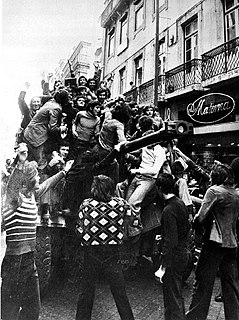 W
WThe Carnation Revolution, also known as the 25 April, was a military coup on 25 April 1974 in Lisbon that overthrew the authoritarian Estado Novo regime, producing fundamental social, economic, territorial, demographic and political changes through the Processo Revolucionário Em Curso, resulting in the Portuguese transition to democracy and the end of the Portuguese Colonial War.
 W
WThe Casablanca Group, sometimes known as the 'Casablanca bloc', was a short-lived, informal association of African states with a shared vision of the future of Africa and of Pan-Africanism in the early 1960s. The group was composed of seven states led by radical, left-wing leaders — Algeria, Egypt, Ghana, Guinea, Libya, Mali, and Morocco. The conflict and eventual compromise between the Casablanca Group and the Monrovia Group led to the establishment of the Organisation of African Unity.
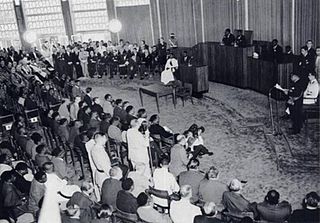 W
WThe Speech at the Ceremony of the Proclamation of the Congo's Independence was a short political speech given by Patrice Lumumba on 30 June 1960 at the ceremonies marking the independence of the Republic of Congo from Belgium. It is best known for its outspoken criticism of colonialism.
 W
WThe decolonization of Africa took place in the mid-to-late 1950s to 1975, with radical regime changes on the continent as colonial governments made the transition to independent states. The process was often marred with violence, political turmoil, widespread unrest, and organised revolts in both northern and sub-Saharan countries including the Algerian War in French Algeria, the Angolan War of Independence in Portuguese Angola, the Congo Crisis in the Belgian Congo, the Mau Mau Uprising in British Kenya, and the Nigerian Civil War in the secessionist state of Biafra.
 W
WThe decolonization of the Americas occurred over several centuries as most of the countries in the Americas gained their independence from European rule. The American Revolution was the first in the Americas, and the British defeat in the American Revolutionary War (1775–1783) was a victory against a great power, aided by France and Spain, Britain's enemies. The French Revolution in Europe followed, and collectively these events had profound effects on the British, Spanish, Portuguese, and French colonies in the Americas. A revolutionary wave followed, resulting in the creation of a number of independent countries in Latin America. The Haitian Revolution lasted from 1791 to 1804 and resulted in the independence of the French slave colony. The Peninsular War with France, which resulted from the Napoleonic occupation of Spain, caused Spanish Creoles in Spanish America to question their allegiance to Spain, stoking independence movements that culminated in various Spanish American wars of independence (1808–33), which were primarily fought between opposing groups of colonists and only secondarily against Spanish forces. At the same time, the Portuguese monarchy fled to Brazil during the French invasion of Portugal. After the royal court returned to Lisbon, the prince regent, Pedro, remained in Brazil and in 1822 successfully declared himself emperor of a newly independent Brazilian Empire.
 W
WDecolonize This Place is a movement based in New York City that organizes around Indigenous rights, black liberation, Palestinian nationalism, de-gentrification, and economic inequality. Their actions often take place at museums and cultural institutions and focus on colonialist tendencies within the art world.
 W
WDecolonizing Methodologies: Research and Indigenous Peoples is a book by Linda Tuhiwai Smith. Originally published in 1999, Decolonizing Methodologies is a seminal text in indigenous studies that explores the intersections of colonialism and research methodologies.
 W
WGuevarism is a theory of communist revolution and a military strategy of guerrilla warfare associated with communist revolutionary Ernesto "Che" Guevara, a leading figure of the Cuban Revolution who believed in the idea of Marxism–Leninism and embraced its principles.
 W
WThe Hong Kong handover, domestically known as the transfer of sovereignty over Hong Kong, was the formal passing of authority over the territory of the then colony of Hong Kong from the United Kingdom to the People's Republic of China at midnight on 1 July 1997. This event ended 156 years of British rule in the former colony. Hong Kong was reestablished as a special administrative region of China, and largely continues to maintain its economic and governing systems distinct from those of mainland China.
 W
WThe Howard School of International Relations is a school of academic thought originating at Howard University in the decades between the 1920s and 1950s. Articulated by scholars such as Merze Tate, Ralph Bunche, Alain Locke, E. Franklin Frazier, Rayford Logan, and Eric Williams, the Howard School emphasized race and empire in the study of international relations. These scholars posed a sustained critique of dominant international relations theories such as racial hierarchy, which vindicated the Jim Crow era in the U.S as well as the practice of colonialism in the world through the 1960s.
 W
WIndependence is a condition of a person, nation, country, or state in which residents and population, or some portion thereof, exercise self-government, and usually sovereignty, over its territory. The opposite of independence is the status of a dependent territory.
 W
WThe Indian independence movement was a series of historic events with the ultimate aim of ending British rule in India. It lasted from 1857 to 1947.
 W
WJuliana was Queen of the Netherlands from 1948 until her abdication in 1980.
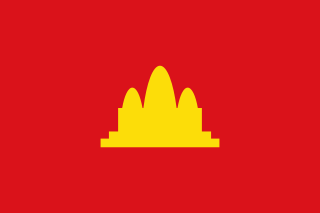 W
WThe Khmer Issarak was a "loosely structured" anti-French and anti-colonial independence movement. Besides, the movement was labelled as “amorphous”. The Issarak was formed around 1945 and composed of several factions each with its own leader. Most of the Issarak bands fought actively between the end of the Second World War in 1945 and Cambodia’s independence in 1953. Initial objectives of the Khmer Issarak was to fight against the French in order to gain independence. Later, overthrowing the Cambodian government became some Issarak bands' agenda. Moreover, the term Issarak originally referred to non-communist, but in the early 1950s the Việt Minh guided-guerrillas called themselves Issaraks for the sake of unifying other non-communist forces.
 W
WLand reform is a form of agrarian reform involving the changing of laws, regulations, or customs regarding land ownership. Land reform may consist of a government-initiated or government-backed property redistribution, generally of agricultural land. Land reform can, therefore, refer to transfer of ownership from the more powerful to the less powerful, such as from a relatively small number of wealthy or noble owners with extensive land holdings to individual ownership by those who work the land. Such transfers of ownership may be with or without compensation; compensation may vary from token amounts to the full value of the land.
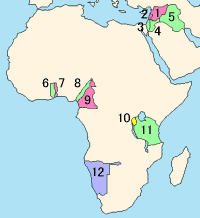 W
WA League of Nations mandate was a legal status for certain territories transferred from the control of one country to another following World War I, or the legal instruments that contained the internationally agreed-upon terms for administering the territory on behalf of the League of Nations. These were of the nature of both a treaty and a constitution, which contained minority rights clauses that provided for the rights of petition and adjudication by the Permanent Court of International Justice.
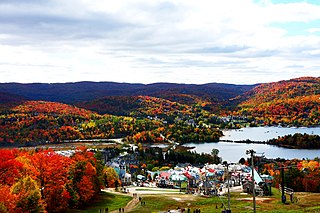 W
WThe Mont Tremblant Conference, or the Eighth International Conference of the Institute of Pacific Relations, was a conference held at Mont-Tremblant in Quebec, Canada, in December 1942, organized by the Institute of Pacific Relations. Unofficial delegates from 12 countries met to discuss the waging of World War II in the Pacific theatre, and the structure of international affairs after the war, with a particular focus on the welfare of countries in East Asia and Southeast Asia.
 W
WThe Movement of the People (MOP) is a Nigerian left-wing pan-African political movement. The organisation was originally formed by Fela Anikulapo Kuti in 1979 as a political party but quickly became inactive due to Fela's confrontations with the government of the day. It has since been revived by Fela's youngest son, Seun Kuti in the wake of the Nigerian End SARS protests of October 2020.
 W
WThe Musée de l'Histoire vivante is an historical museum located in Montreuil-sous-bois, adjacent to the eastern part of Paris, France.
 W
WThe Republic of the North Solomons was an unrecognised state that purported to exist for about six months in what is now the Autonomous Region of Bougainville, Papua New Guinea (PNG). It involved:a 'Unilateral Declaration of Independence of the Republic of North Solomons' and a failed bid for self-determination at the UN
 W
WPan-Celticism, also known as Celticism or Celtic nationalism is a political, social and cultural movement advocating solidarity and cooperation between Celtic nations and the modern Celts in North-Western Europe. Some pan-Celtic organisations advocate the Celtic nations seceding from the United Kingdom and France and forming their own separate federal state together, while others simply advocate very close cooperation between independent sovereign Celtic nations, in the form of Irish nationalism, Scottish nationalism, Welsh nationalism, Breton nationalism, Cornish nationalism and Manx nationalism.
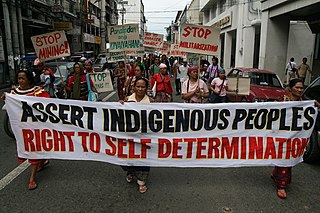 W
WThe right of a people to self-determination is a cardinal principle in modern international law, binding, as such, on the United Nations as authoritative interpretation of the Charter's norms. It states that people, based on respect for the principle of equal rights and fair equality of opportunity, have the right to freely choose their sovereignty and international political status with no interference.
 W
WLinda Tuhiwai Te Rina Smith is a professor of indigenous education at the University of Waikato in Hamilton, New Zealand. The daughter of Hirini Moko Mead, she affiliates to the Ngāti Awa and Ngāti Porou iwi.
 W
WThe United Nations Special Committee on the Situation with Regard to the Implementation of the Declaration on the Granting of Independence to Colonial Countries and Peoples, or the Special Committee on Decolonization (C-24), is a committee of the United Nations General Assembly that was established in 1961 and is exclusively devoted to the issue of decolonization.
 W
WThe United Nations General Assembly Fourth Committee is one of six main committees of the United Nations General Assembly. It deals with a diverse set of political issues, including UN peacekeeping and peaceful uses of outer space. However, the issues of decolonization and the Middle East take up most of its time.
 W
WThe South West Africa People’s Organisation, officially known as the SWAPO Party of Namibia, is a political party and former independence movement in Namibia. It has been the governing party in Namibia since the country achieved independence in 1990. The party continues to be dominated in number and influence by the Ovambo ethnic group.
 W
WThe transfer of sovereignty of Macau from Portugal to the People's Republic of China (PRC) occurred on 20 December 1999.
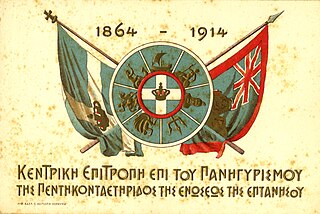 W
WThe Treaty of London in 1864 resulted in Great Britain ceding the United States of the Ionian Islands to Greece. Britain had held an amical protectorate over the islands since the 1815 Treaty of Paris.
 W
WUbuntu is a Nguni Bantu term meaning "humanity". It is sometimes translated as "I am because we are", or "humanity towards others". In Xhosa, the latter term is used, but is often meant in a more philosophical sense to mean "the belief in a universal bond of sharing that connects all humanity".
 W
WThe United Nations General Assembly Fourth Committee is one of six main committees of the United Nations General Assembly. It deals with a diverse set of political issues, including UN peacekeeping and peaceful uses of outer space. However, the issues of decolonization and the Middle East take up most of its time.
 W
WUnited Nations General Assembly Resolution 1654 of 27 November 1961, titled "The situation with regard to the implementation of the Declaration on the Granting of Independence to Colonial Countries and Peoples" was a resolution of the United Nations General Assembly during its sixteenth session. It reaffirmed the Declaration on the Granting of Independence to Colonial Countries and Peoples in Resolution 1514 (XV) of 14 December 1960.
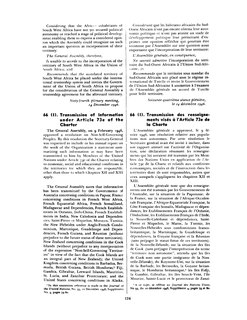 W
WChapter XI of the United Nations Charter refers to a non-self-governing territory (NSGT) as a territory “whose people have not yet attained a full measure of self-government.” In practice, a NSGT is a territory deemed by the United Nations General Assembly (UNGA) to be "non-self-governing". Chapter XI of the UN Charter also includes a "Declaration on Non-Self-Governing Territories" that the interests of the occupants of dependent territories are paramount and requires member states of the United Nations in control of such territories to submit annual information reports concerning the development of those territories. Since 1946, the UNGA has maintained a list of non-self governing territories under member states' control. Since its inception, dozens of territories have been removed from the list, typically when they attained independence or internal self-government, while other territories have been added as new administering countries joined the United Nations or the General Assembly reassessed the status of certain territories.
 W
WUnited Nations trust territories were the successors of the remaining League of Nations mandates and came into being when the League of Nations ceased to exist in 1946. All of the trust territories were administered through the United Nations Trusteeship Council. The concept is distinct from a territory temporarily and directly governed by the United Nations.
 W
WWars of national liberation or national liberation revolutions are conflicts fought by nations to gain independence. The term is used in conjunction with wars against foreign powers to establish separate sovereign states for the rebelling nationality. From a different point of view, such wars are called insurgencies, rebellions, or wars of independence. Guerrilla warfare or asymmetric warfare is often utilized by groups labeled as national liberation movements, often with support from other states.
 W
WThe United Nations Mission for the Referendum in Western Sahara is the United Nations peacekeeping mission in Western Sahara, established in 1991 under United Nations Security Council Resolution 690 as part of the Settlement Plan, which had paved way for a cease-fire in the conflict between Morocco and the Polisario Front over the contested territory of Western Sahara.